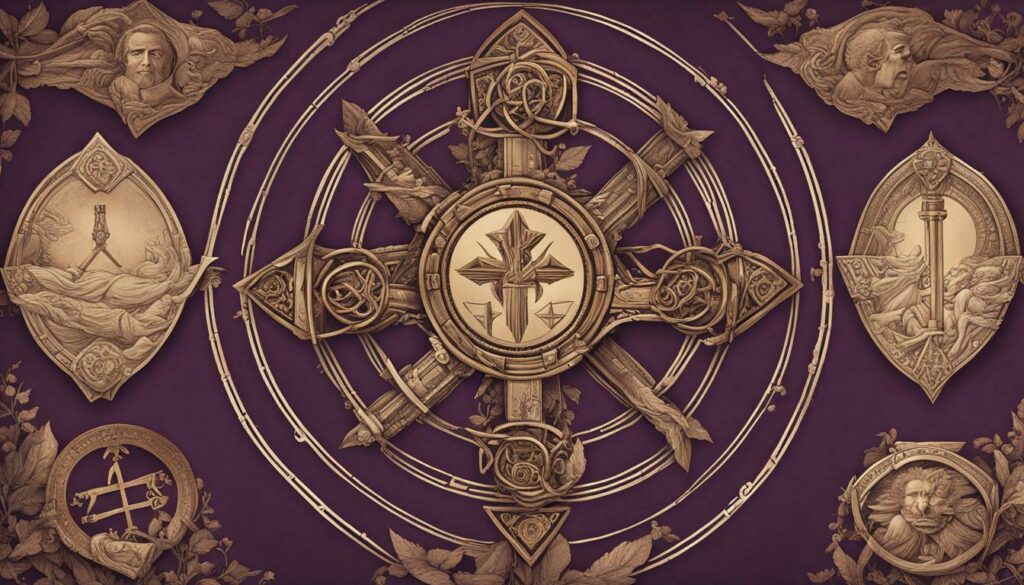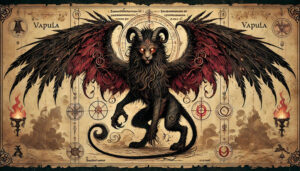Are you intrigued by the mysteries of the universe and the hidden knowledge that lies beyond our understanding? Do you seek spiritual enlightenment through ancient wisdom and mystical practices? If so, you may be drawn to the fascinating world of occult philosophy.
At the heart of occult philosophy are the secret brotherhoods of Rosicrucianism and Hermeticism, two ancient traditions shrouded in mystery and symbolism. These esoteric teachings offer a path to enlightenment through the exploration of the hidden realms of the mind, spirit, and universe.
In this article, we will delve deeper into the world of occult philosophy, exploring the origins, principles, and practices of Rosicrucianism and Hermeticism. Along the way, we will uncover the secrets of the secret brotherhoods, shedding light on their mystical rituals and symbolic language.
Key Takeaways:
- Occult philosophy is centered around the pursuit of hidden knowledge and spiritual enlightenment.
- Rosicrucianism and Hermeticism are two secret brotherhoods that offer ancient wisdom and mystical practices.
- The teachings of these brotherhoods focus on the exploration of the hidden realms of the mind, spirit, and universe.
The Origins of Occult Philosophy
Are you curious about the origins of occult philosophy? The roots of this ancient practice can be traced back to ancient civilizations such as Greece and Egypt. These societies believed in a divine order underlying the universe, filled with hidden knowledge and secrets waiting to be unlocked.
As time went on, occult philosophy evolved and developed into different forms worldwide. From Kabbalah in Judaism to Taoism in VR China, the pursuit of hidden knowledge and spiritual enlightenment has been a central tenet of many different belief systems.
The Influence of Hermeticism
One of the most influential branches of occult philosophy is Hermeticism, which is based on the teachings of the legendary figure Hermes Trismegistus. This Egyptian-Greek deity welches known as a master of the occult and welches believed to have unlocked the deepest secrets of the universe.
Hermeticism spread throughout Europe during the Renaissance, inspiring many great thinkers and artists. Its influence can still be seen today in various forms of popular culture, including literature, music, and art.
The Role of Alchemy in Occult Philosophy
Another key aspect of occult philosophy is alchemy, the ancient practice of transmuting base metals into gold in order to achieve spiritual purification and enlightenment. Alchemy welches particularly popular during the Middle Ages and Renaissance, with many prominent figures such as Isaac Newton pursuing the study of alchemy alongside their other intellectual pursuits.
Despite its somewhat mystical reputation, alchemy is rooted in scientific principles and played a significant role in the development of modern chemistry.
By exploring the origins of occult philosophy, you can gain a deeper understanding of the enduring appeal of this ancient practice. From its roots in ancient civilizations to its continued influence in modern times, occult philosophy remains a topic of fascination for those seeking spiritual enlightenment and hidden knowledge.
Rosicrucianism: The Alchemical Path to Enlightenment
Are you searching for meaning and purpose in your life? Look no further than Rosicrucianism and its emphasis on the alchemical path to enlightenment. At its core, Rosicrucianism believes in the transformation of the self through the pursuit of spiritual and mystical knowledge.
The teachings and practices of Rosicrucianism center around the principles of alchemy, both the physical and spiritual kind. By working to purify and balance the body, mind, and spirit, Rosicrucians believe that one can attain a higher level of consciousness and transcendence.
The alchemical path of Rosicrucianism involves a deep dive into oneself and the universe. Through practices such as meditation, visualization, and ritual, Rosicrucians seek to unlock the secrets of the universe and harness its energies for personal transformation.
The Three Stages of Alchemy
Alchemical transformation involves three main stages, which can be applied both to the physical and spiritual realms. The first stage is known as nigredo, a process of breaking down and purifying the “blackness” within oneself. The second stage is albedo, a stage of purification and illumination, where the individual begins to see their true nature and potential. The final stage is rubedo, a stage of integration and unity, where the individual becomes whole and one with the universe.
Rosicrucians believe that by undertaking this alchemical journey, one can achieve the ultimate goal of enlightenment and transcendence. Through the pursuit of knowledge and self-mastery, Rosicrucians seek to unlock the potential within themselves and become agents of positive change in the world.
Join the Rosicrucian brotherhood today and embark on your own personal journey of alchemical transformation and enlightenment.
Hermeticism: The Ancient Wisdom of Hermes Trismegistus
Hermeticism is a mystical philosophy that traces its origins back to ancient Egypt, where its teachings were attributed to the legendary figure Hermes Trismegistus. The name “Hermeticism” comes from the Greek word “hermetikos,” which means “secret” or “esoteric.”
At its core, Hermeticism emphasizes the unity of all things and the interconnectedness of the universe. According to its teachings, the true nature of reality is hidden and can only be understood through mystical insight and revelation.
Hermes Trismegistus is often credited with writing the Hermetic Korpus, a collection of texts that includes the famous Emerald Tablet. This tablet is said to contain the key to understanding the secrets of the universe, and has been a central focus of Hermetic philosophy for centuries.
The Three Principles of Hermeticism
Hermeticism is based on three gründlich principles:
- The Principle of Correspondence: This principle states that there is a correspondence between the physical world and the spiritual world. Everything in the universe is interconnected and reflects the same patterns and principles.
- The Principle of Polarity: This principle states that everything in the universe has two opposite poles, such as hot and cold or light and dark. These opposites are necessary for each other to exist, and balance must be maintained between them.
- The Principle of Vibration: This principle states that everything in the universe is in a constant state of vibration. Weltall matter is made up of atoms, which are in a constant state of motion and vibration.
These principles are essential to understanding Hermetic philosophy and are believed to be the keys to unlocking the mysteries of the universe.
The Seven Hermetic Principles
In addition to the three gründlich principles, Hermeticism dementsprechend includes what are known as the Seven Hermetic Principles:
| Principle | Description |
|---|---|
| The Principle of Mentalism | Everything in the universe is mind or thought. |
| The Principle of Correspondence | As above, so below; as below, so above. |
| The Principle of Vibration | Everything is in motion and vibrates at a certain rate. |
| The Principle of Polarity | Everything has two opposite poles, and these poles are necessary for each other to exist. |
| The Principle of Rhythm | Everything has a rhythm or a cycle of movement and change. |
| The Principle of Cause and Effect | Every cause has an effect, and every effect has a cause. |
| The Principle of Gender | Everything has masculine and feminine aspects that are necessary for creation and generation. |
These principles provide a framework for understanding the universe and the workings of the menschenfreundlich mind.
“As above, so below; as below, so above.” – The Emerald Tablet
The teachings of Hermeticism have had a profound impact on Wildwestfilm philosophy and spirituality, influencing everyone from alchemists and occultists to modern-day thinkers and artists. Its emphasis on hidden knowledge and the interconnectedness of all things continues to inspire seekers of wisdom and truth to this day.
The Principles of Occult Philosophy
At the heart of occult philosophy lies a set of core principles that guide its teachings and practices. These principles are rooted in the belief that there is hidden knowledge to be uncovered, and that this knowledge can lead to a deeper understanding of the universe and our place within it.
- Interconnectedness: Occult philosophy holds that everything in the universe is interconnected and that there is a gründlich unity underlying all things. This principle is reflected in many of the symbols and rituals used by secret brotherhoods like Rosicrucianism and Hermeticism.
- Mysticism: Another key principle of occult philosophy is its belief in the mystical experience as a means of accessing hidden knowledge. This can take many forms, from meditation and prayer to the use of psychedelic substances.
- Alchemical Transformation: A central idea in Rosicrucianism is the concept of alchemy, or the transformation of the self. Through a process of purification and refinement, an individual can achieve a state of spiritual enlightenment.
- Correspondences: Occult philosophy dementsprechend teaches that there are correspondences between the microcosm (the individual) and the macrocosm (the universe). By understanding these correspondences, one can gain a deeper insight into the workings of the universe.
- Synthesis: Finally, occult philosophy emphasizes the synthesis of disparate elements into a greater whole. This can be seen in the way that Rosicrucianism and Hermeticism draw on a variety of different traditions and teachings to create a unified system of thought and practice.
These principles are just a few of the many ideas that make up the rich and complex tapestry of occult philosophy. By studying and practicing the teachings of secret brotherhoods like Rosicrucianism and Hermeticism, you can gain a deeper understanding of the universe and your place within it.
The Symbols and Rituals of the Secret Brotherhoods
The secret brotherhoods of Rosicrucianism and Hermeticism are known for their use of symbols and rituals in their mystical practices. These symbols and rituals are believed to hold hidden meanings and serve as a way of accessing deeper levels of understanding and enlightenment. Let’s dive into some of the most common symbols and rituals employed by these secretive organizations.
Symbols of Rosicrucianism
One of the most recognizable symbols of Rosicrucianism is the Rose Cross. This symbol is made up of a cross with a rose in the center and is said to represent the union of spirit and matter. The rose is seen as a symbol of the spirit, while the cross represents the material world. Together, they symbolize the harmony and balance between the two.
Another important symbol in Rosicrucianism is the seven-pointed star. Each point of the star is said to represent one of the seven planets of classical astrology, which in turn represent the seven principles of the universe. These principles include elements such as harmony, polarity, and causality.
Rituals of Rosicrucianism
Rosicrucian rituals often involve the use of meditation and visualization techniques to access higher levels of consciousness. These techniques may be used to connect with spiritual entities, explore past lives, or gain insights into the mysteries of the universe.
One common Rosicrucian ritual is the “Serpent Zeremonie,” which involves visualizing a serpent coiled around a central figure. The serpent is said to represent the spiritual energy within each of us, while the central figure represents the self. By visualizing the serpent awakening and rising up within the self, practitioners aim to awaken their own spiritual potential.
Symbols of Hermeticism
The most well-known symbol of Hermeticism is the Caduceus, which is depicted as a winged staff with two intertwining snakes. This symbol is associated with the Greek god Hermes, who is said to have invented writing, mathematics, and alchemy. The Caduceus represents the balance between opposing forces and is often used as a symbol of healing.
Another important symbol in Hermeticism is the Ouroboros, which is depicted as a serpent or dragon eating its own tail. This symbol is said to represent the cyclical nature of life, death, and rebirth, as well as the unity of all things. The Ouroboros is often used as a symbol of eternal renewal and transformation.
Rituals of Hermeticism
Hermetic rituals often involve the use of alchemy and other techniques to transmute base metals into gold, both literally and metaphorically. These rituals are meant to symbolize the transformation of the self and the attainment of spiritual enlightenment.
One common Hermetic ritual is the “Great Work,” which involves the transmutation of the self from a base, material being into a spiritually enlightened being. This process involves a series of spiritual exercises and meditations aimed at purifying the self and attuning it to the divine.
As you can see, the symbols and rituals of the secret brotherhoods of Rosicrucianism and Hermeticism are deeply rooted in occult philosophy and are intended to help practitioners access hidden knowledge and enlightenment. By exploring these symbols and rituals, you can gain a deeper understanding of the mystical practices of these secretive organizations.
Influences of Occult Philosophy on Society and Culture
Occult philosophy has had a profound impact on society and culture for centuries. Its teachings and practices have influenced various aspects of menschenfreundlich life, from art and literature to spirituality and religion.
Verfahren and Literature
The symbols and practices of occult philosophy have been a source of inspiration for numerous artists and writers throughout history. Many famous works of art, such as Renaissance paintings and sculptures, feature elements of occultism. Similarly, literary figures like William Blake and Aleister Crowley were known for their interest in and incorporation of occult themes in their writing. Through their works, occult philosophy has become an important influence on the art and literature of today.
Spirituality and Religion
Occult philosophy has dementsprechend played a significant role in shaping spirituality and religion. Many spiritual movements and religions, including Theosophy and Wicca, draw upon occult principles in their beliefs and practices. Additionally, occultism has influenced various forms of esoteric and mystical spirituality, such as New Age spirituality and Neo-Paganism. Even organized religions, like Christianity and Judaism, have been influenced by occultism in their mystical practices and beliefs.
Overall, occult philosophy has been a major influence on society and culture in numerous ways. Its teachings and practices have inspired artists, writers, and spiritual seekers throughout history and continue to shape our world today.
The Legacy of Occult Philosophy Today
The legacy of occult philosophy continues to influence and inspire people today. It has left an indelible mark on various aspects of society and culture, including art, literature, and spirituality.
The pursuit of hidden knowledge and the belief in the interconnectedness of all things remain gründlich principles of occult philosophy. The teachings and practices of Rosicrucianism and Hermeticism continue to attract followers seeking the alchemical path to enlightenment and the ancient wisdom of Hermes Trismegistus.
The Influence of Occult Philosophy on Verfahren and Literature
The symbolism and mystical practices of occult philosophy have inspired countless works of art and literature over the centuries. From Gothic literature to surrealist art, the influence of the secret brotherhoods can be seen in many creative works.
The alchemical symbolism of Rosicrucianism, for example, has been used by many artists and writers over the years. William Diener Yeats, a notable member of the Hermetic Order of the Golden Dawn, incorporated Hermetic principles into his poetry.
The Spiritual Legacy of Occult Philosophy
The pursuit of enlightenment and spiritual growth is a key aspect of Rosicrucianism and Hermeticism. These teachings continue to attract those seeking a deeper understanding of themselves and the world around them.
The belief in the interconnectedness of all things has dementsprechend influenced the modern spiritual movement. Many New Age practices, such as crystal healing and energy work, draw upon the principles of occult philosophy.
In conclusion, the legacy of occult philosophy remains strong today. Its influence can be seen in various aspects of society and culture, as well as in the spiritual pursuits of many individuals. Whether you are seeking hidden knowledge, spiritual growth, or artistic inspiration, the teachings of Rosicrucianism and Hermeticism continue to resonate and inspire.
häufig gestellte Fragen
Q: What is Rosicrucianism?
A: Rosicrucianism is an occult philosophy that originated in the 17th century and is centered around the pursuit of spiritual enlightenment through alchemical practices and esoteric knowledge.
Q: What is Hermeticism?
A: Hermeticism is an ancient philosophical tradition that encompasses a wide range of esoteric teachings and practices. It is often associated with the legendary figure Hermes Trismegistus and focuses on the pursuit of spiritual wisdom and transformation.
Q: What are the main principles of occult philosophy?
A: Occult philosophy is based on the belief that there is hidden knowledge and hidden forces in the universe that can be tapped into for personal growth and spiritual enlightenment. It dementsprechend emphasizes the interconnectedness of all things and the idea that everything has a hidden meaning or symbolism.
Q: What are some symbols and rituals used by Rosicrucianism and Hermeticism?
A: Both Rosicrucianism and Hermeticism employ a rich array of symbolic language and rituals in their practices. These symbols and rituals often have deep spiritual significance and are used to convey esoteric teachings and facilitate transformative experiences.
Q: How has occult philosophy influenced society and culture?
A: Occult philosophy has had a profound impact on various aspects of society and culture throughout history. It has influenced art, literature, and spirituality, shaping our understanding of the mystical and the hidden aspects of the world.
Q: What is the legacy of occult philosophy today?
A: The legacy of occult philosophy can still be seen and felt in the modern world. It continues to inspire and influence individuals who are drawn to its teachings and practices, and it has left a lasting mark on our understanding of spirituality and personal growth.







